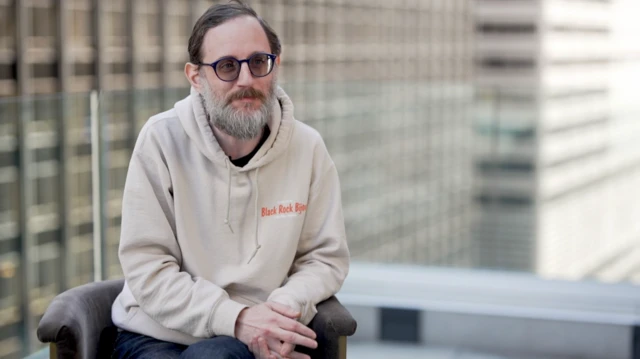Kat Torres, the former Brazilian model and influencer convicted of human trafficking and slavery

By BBC Eye/BBC News Brasil/João Fellet/Hannah Price,15 Jul 2024
When two young Brazilian women were reported missing in September 2022, their families and the FBI began a desperate search to find them. All they knew was that they were living with Brazilian influencer Kat Torres in the US.
On June 28, 2024, Kat was sentenced to eight years in prison for subjecting one of these women to human trafficking and conditions similar to slavery.
An investigation into allegations made by other women against Kat is underway in Brazil.
How did the former model who met Leonardo DiCaprio and appeared on the cover of international magazines manage to attract her followers to sexual exploitation?

"For me, she was a trustworthy person who understood my pain, understood what I was going through," says Ana when describing the beginning of her relationship with Kat after meeting her on Instagram in 2017.
Ana was not one of the missing women who prompted the FBI's search – but she was also a victim of Kat's coercion and was instrumental in rescuing these women.
She says she was drawn to Torres's journey, from her childhood in a favela in Belém to international catwalks and parties with Hollywood celebrities.
"She said she had already overcome several abusive relationships and that was exactly what I was looking for," Ana told a team from BBC Eye Investigations and BBC News Brasil.

Ana was in a vulnerable situation. She says she had a violent childhood, moved alone from southern Brazil to the US and had already been in an abusive relationship.
Kat Torres had recently published the autobiographical book A Voz , in which she claims to be able to make predictions and have spiritual powers, and had already appeared on TV programs in Brazil.
"She was on magazine covers, she was seen with famous people like Leonardo DiCaprio, everything I saw seemed credible," she says.
Ana says she was especially drawn to Torres’ approach to spirituality.
What Ana didn't know was that the inspiring story Kat told was based on half-truths and lies.
Actor and writer Luzer Twersky, who shared an apartment with Kat in New York, told us that the she changed after attending ayahuasca circles with friends in Hollywood.
Originating in the Amazon, ayahuasca is a psychedelic drink considered sacred by some religions and indigenous peoples.
"That's when she started to lose control," he says.
Twersky said he also believed Kat was working as a sugar baby , receiving money for romantic entanglements with wealthy and powerful men - and who paid for the apartment he shared with her friend.

Kat's website had a subscription service and promised customers "the love, money and self-esteem you've always dreamed of."
Her videos offered advice on relationships, well-being, business success and spirituality – including hypnosis, meditation and exercise programs.
For an additional $150, customers could schedule one-on-one video consultations with Kat, who she said could solve any problem.
Amanda, another former client, says Kat made her feel special.
"All my doubts, my questions, my decisions: I always took them to her first, so that we could make decisions together," says Amanda.
But Kat's advice could lead to radical changes.
Ana, Amanda and other former followers say they found themselves increasingly isolated psychologically from friends and family and willing to do whatever Kat suggested.
When Kat asked Ana in 2019 to move into her home in New York to work as her assistant, she agreed.
She was studying nutrition at a college in Boston but decided to take classes virtually instead and says she accepted an offer to take care of Kat's pets, cook, wash and clean for about $2,000 a month.
Upon arriving at Kat's apartment, however, she quickly realized that the conditions did not match the perfection displayed on Instagram.
"It was shocking because the house was very messy, very dirty, it didn't smell good," she says.
Ana says Kat seemed unable to do even the most basic things, like taking a shower, alone because she couldn't stand being without someone to be around.
She says she had to be constantly at Kat's disposal and could only sleep a few hours at a time on a couch soiled with cat urine.

She says she would sometimes hide in the building's gym to sleep on the exercise mat.
"Now I see that she was using me like a slave," says Ana.
She also says she was never paid.
“I felt like I was trapped,” she says. “I was probably one of Kat’s first victims of human trafficking.”
Ana had given up her university accommodation in Boston, so she had nowhere to return to and no income to pay for alternative housing.
Ana says that Kat, when confronted, became aggressive, which made Ana remember periods in which she experienced domestic violence.
After three months, Ana found a way to escape and moved in with a new boyfriend.
But that wasn't the end of Ana's involvement in Kat's life.
When the families of two other young Brazilian women reported them missing in September 2022, Ana knew she had to act.
At the time, Kat was married to a man named Zach, a 21-year-old she had met in California, and they lived in a rented five-bedroom house in the suburbs of Austin, Texas.
Repeating the pattern used with Ana, Kat targeted her most dedicated followers, trying to recruit them to work for her.
In return, she promised to help them achieve their dreams, drawing on intimate personal information they had shared with her during their coaching sessions.
Desirrê Freitas, a Brazilian woman who lived in Germany, and Brazilian Letícia Maia - the two women whose disappearance prompted the FBI-led operation - moved to live with Kat.
Another Brazilian woman, who we call Sol, was also recruited.
Kat introduced on social media what she called her "witch coven".

The BBC has learned that at least four other women were almost persuaded to move into Kat's home but backed out.
Some of the women interviewed were wary of appearing in a BBC documentary, fearing online abuse and still traumatised by their experiences.
But we were able to verify her accounts using court documents, text messages, bank statements, and a book by Desirrê about her experiences, @Searching Desirrê, published by DISRUPTalks (2023).
Desirrê says that, in her case, Kat bought her a plane ticket so that she could leave Germany and come find her, citing suicidal thoughts and asking for help.
Kat is also accused of convincing Letícia, who was 14 when she began coaching sessions with her, to move to the US for an au pair program (a nanny who lives in the family's home) and then live and work with her.
As for Sol, she says she agreed to move in with Kat after becoming homeless and was hired to do tarot readings and teach yoga.
But it didn't take long for the women to discover that reality was very different from the fairy tale they had been promised.
Within a few weeks, Desirrê says Kat pressured her to work at a strip club and said that if she didn't comply, she would have to return all the money she spent on airfare, lodging, furniture for her room and even "witchcraft" rituals performed by Kat.
Desirrê says that, in addition to not having that money, she also believed at the time in the spiritual powers that Kat claimed to have. So when Kat threatened to curse her for not following her orders, she was terrified.
Reluctantly, Desirrê then agreed to work as a stripper.
A manager at the strip club, James, told the BBC she worked long hours, seven days a week.
Desirrê and Sol say the women in Kat's Austin home were subject to strict rules.
They claim they were forbidden from speaking to each other, needed Kat's permission to leave their rooms - even to use the bathroom - and were forced to hand over any money they received.

"It was very difficult to get out of the situation because she kept our money," Sol told the BBC.
"It was scary. I thought something might happen to me because she had all my information, my passport, my driver's license."
But Sol says she realised she needed to flee after overhearing a phone call in which Kat told another client she had to work as a prostitute in Brazil as "punishment".
Sol managed to get out with the help of an ex-boyfriend.
Meanwhile, the guns Kat's husband kept at home began to appear regularly in Instagram posts and became a source of fear for the women.
At that time, Desirrê says that Kat tried to convince her to leave the strip club for work as a prostitute. She says she refused and, the next day, Kat took her to a shooting range by surprise.
Scared, Desirrê says she ended up giving in to Kat's demands.
"Many questions haunted me: 'Could I stop whenever I wanted?'" writes Desirrê in her book.
"What if the condom broke, would I catch a disease? Could [the client] be an undercover cop and arrest me? What if he killed me?"
If the women failed to meet the money targets set by Kat, which rose from $1,000 to $3,000 a day, they were not allowed to return home that night, they say.
"I ended up sleeping on the street several times because I couldn't reach my goal," says Desirrê.
Bank statements obtained by the BBC show that Desirrê transferred more than $21,000 (R$114,500) to Kat's account in June and July 2022 alone.
She says she was forced to hand over an even larger amount of cash.
Prostitution is illegal in Texas, and Desirrê says Kat threatened to report her to the police when she considered stopping.
In September, friends and family of Desirrê and Letícia in Brazil created campaigns on social media to find them after months of not being in contact with the two.
By this point, they were almost unrecognizable. Their brown hair had been dyed platinum blonde to match Kat's.
Desirrê claims that, during this period, all her telephone contacts were blocked and that she obeyed Kat's orders without question.
As the Instagram page @SearchingDesirrê gained traction, the story made headlines in Brazil.
Desirrê's friends feared she had been murdered, and Letícia's family made desperate pleas for the two to return home.
Ana, who lived with Kat in 2019, said she was alarmed when she saw the news. She says she quickly realized Kat was "holding other girls back."
Along with other former clients, Ana began contacting as many law enforcement agencies as possible, including the FBI, in an attempt to arrest the influencer.
Five months earlier, she and Sol had reported Torres to US police – but say they were not taken seriously.
In a video she recorded at the time as evidence and shared with the BBC, Ana can be heard saying, in English: "This person is very dangerous and has already threatened to kill me."
Profiles of the missing women were then found on escort and prostitution websites. The suspicions of sexual exploitation, which had been circulating on social media, seemed to be confirmed.
Panicked by the media attention, Kat and the women traveled more than 2,000 miles from Texas to Maine.
In videos on Instagram, Desirrê and Letícia denied being there against their will and demanded that people stop looking for them.
But a recording obtained by the BBC indicates what was really happening at that moment.
Police in the US were monitoring the group, and an officer was able to contact Kat via video call to assess the women's situation.
Just before the conversation begins, Kat says in the video:
"He's going to start asking questions. Guys, they're tricksters. He's a detective, be careful. For God's sake, I'll kick you if anyone says anything. I'll scream."
In November 2022, police persuaded Kat and the other two women to appear in person at a police station in Franklin County, Maine.
The police officer who questioned Kat, Desirrê and Letícia – Detective David Davol – told the BBC that he and his colleagues became concerned after noticing a number of signs, including the women's distrust of the officers, their isolation and their reluctance to speak without Kat's permission.
"Human traffickers aren't always like in the movies, where you have a gang kidnapping people. It's much more common for it to be someone you trust."
By December 2022, the two women had returned safely to Brazil.
According to the UN, human trafficking is one of the fastest growing crimes in the world, generating around US$150 billion (R$817 billion) in profits per year worldwide.
He believes social media provides a platform for traffickers to find and seduce victims.

In April of this year, our team received court permission to interview Kat in prison – the first in-person interview she has given since her arrest.
At that time, Kat was still awaiting the outcome of a trial related to Desirrê's case.
Smiling, Kat approached us with a calm and serene demeanor.
She claimed complete innocence, denying that any woman had lived with her or that she had forced anyone into prostitution.
"I had fits and fits of laughter at all the lies I heard. Everyone in the room could see that the witnesses were lying," he said.
"People call me a fake guru, but at the same time they say: she is very dangerous. Be careful with her, because she can change what people think."
When we confronted her with the evidence we had seen, she became more hostile, accusing us of lying as well.
"You can see me as Katiuscia, you can see me as Kat, you can see me as God, you can see me as whatever you want to see. And you can take my advice or not, it's your problem, it's your choice," he said.
As she got up to go back to her cell, she suggested that we would soon find out whether she had powers or not. Then she pointed at me and said, "I didn't like her."
On June 28, Kat was sentenced by judge Marcelo Luzio Marques Araújo, of the 10th Federal Court of Rio de Janeiro, to eight years in prison for subjecting Desirrê to human trafficking and conditions analogous to slavery.
The judge concluded that Kat lured the young woman to the US for the purpose of sexual exploitation.
More than 20 women have come forward to say they were scammed or exploited by Kat – many of whom have shared their experiences with the BBC.
Some are still undergoing psychiatric treatment to recover from what they say they experienced in their relationships with Kat.
Kat's lawyer, Rodrigo Menezes, told the BBC he had appealed the conviction and insisted she was innocent.
An investigation based on complaints from other women against Kat is underway in Brazil.
Ana believes that even more victims will come forward once they read about Kat's crimes. This was the first time Ana has spoken out publicly.
She says her goal is to make people recognize that Kat's actions constitute a serious crime and not "Instagram drama."
In the final pages of her book, Desirrê also reflects on her experiences.
"I'm not fully recovered yet, I've had a challenging year. I was sexually exploited, enslaved and imprisoned. I hope my story serves as a wake-up call."
Video interview with Kat Torres 3 weeks ago.
